Imagine if we ruled the world?
On feminism, superstition, and the ancient wisdom of the east.
This article is from my latest newsletter over at mazhalima.substack.com. I write a newletter every fortnight on many subjects – love, witchcraft, racism, heritage, and alot more. You can subscribe HERE.
This time last week was Friday the 13th and since then, I’ve been thinking about its association with bad luck and what a lie it is. In ancient cultures the number 13 was in divine alignment with femininity and the lunar calendar, which were deeply intertwined. Society recognised women as goddesses due to their celestial connection with the 13 moons through menstruation and their ability to create life.
Friday is named after the Goddess Freya – represented by Venus, there’s no stronger feminine energy than that. When Friday the 13th came around, it was the perfect time to honour the cycles of death and rebirth. But the dawn of Christianity saw the destruction of the idea of Friday the 13th being positive, and 12 became the new 13. There were 12 disciples at the last supper, and Judas was number 13 – say no more. Friday was the day that Eve (allegedly) told Adam to eat the apple. Adam was kicked out of paradise on a Friday. Friday was the day Jesus was crucified. In Rome they believed that witches gathered in covens of 12, and the thirteenth participant was the devil.
Before the patriarchy existed, a woman was thought to be at the height of her powers when she was ovulating – she was in a state to receive, carry, and manifest new life. An absolute miracle. A bleeding woman was magic, although this concept was later vilified – soon, women were to be portrayed as witches who deserved to be burnt alive. In large part, patriarchy was a mass exercise in storytelling – in changing the narrative. What was divine was now evil. Has that narrative really changed since the times of Salem?
In July 2021, 33-year-old Shaista Farzeen was in Manchester visiting family for Eid when she heard a blood-curdling scream outside. She looked outside to see a woman on fire.
“I have never seen anything like it. This woman was on fire. We all came running out and she was sat there on the pavement.
“She was gasping for breath. Her hair was singed. There was no part of her body that wasn’t burnt. People used pillows and cushions to try and douse the fire and we wrapped a wet duvet around her until the ambulance came. I was in shock.”
This woman was 31-year-old Sarah Hussein. News reports on what happened to her are minimal, and the BBC headline reads ‘woman found on fire in street’. It was egregiously neglectful reporting with a tone so vague it feels sinister.
Three men were arrested for Sarah’s murder but were later bailed. Nobody has been held accountable for her murder, and all reports stick to the story that she was simply ‘found on fire’. Sarah’s body was flown back to Pakistan for burial this month, and no more has been said about it. What happened to Sarah? She didn’t spontaneously combust. Why wasn’t a woman burning to death on the street in the UK headline news?

On August 9 2021, the body of woman Jomaa Jerrare was found on a layby in Wolverhampton. Her body had been set on fire. Two men have been arrested pending investigation. The story made local news, but again – no national coverage, and no headlines. Two women were horrifically burnt to death by men in the UK in the space of a month, and they became nothing but footnotes.
In Afghanistan, there have been reports of women setting themselves on fire since war engulfed their country over the past two decades. Although, I’m sure they’ve been doing it for longer than that.
“To my daughter I will say, when men come, set yourself on fire.”
― Warsan Shire, ‘Teaching My Mother How to Give Birth’
In the early noughties it was reported at least 87% of women in Afghanistan have experienced domestic abuse.
A few years ago in a hospital in the Herat province of Afghanistan, Habiba* could barely speak after suffering third-degree burns across 85% of her body. Her family couldn’t understand it – why would this happen? Habiba had a good life. But when she was able to speak, she told reporters (sourced via the Guardian) that her family forced her into a marriage with a man who made her life hell. After being beaten for years and having her cries for help ignored by everyone – from the police to her family – she saw no other way out but self-immolation.
Laila* was placed in the burns unit in Herat after being set on fire by her husband. “I was sleeping, after a fight where he accused me of being disloyal, when he poured kerosene over me and set me on fire; I woke up with this intense sensation of pain.”
Psychiatrist Dr. Hadi Rasooli from Herat said: “Domestic violence in Afghanistan is still very, very high; as are the cases of suicide among women facing abuse. Women are still killing themselves, they’re just doing it differently.” Most women in Afghanistan who attempt to complete suicide by fire are 16 to 20 years old, and hundreds of them pass away by self-immolation every year.
19-year-old self-immolation survivor Zarah was beaten incessantly by her husband for months before she set herself on fire. “I believed I would die. I wanted to prove to my husband that I didn’t want to live with him.”
I’m not equipped with enough knowledge to talk about what is happening in Afghanistan quite yet, I’ll be honest. Women’s rights were stripped away in the blink of an eye and I feel the angst from across the seas. I feel the survivor’s guilt, my own privilege, the self-loathing for having the audacity to complain about anything at all. I understand my own history with Afghanistan; my DNA test results tell me my Afghani heritage derives from Kabul specifically. I know that life is a lottery and I’m lucky to be here.
Or am I? Whether you’re in Manchester or Kabul, women are being set on fire by the patriarchy. I watched a documentary a while back that said:
“A happy woman is always a lucky woman, always thinking of the woman less lucky – always thinking of the women less free. She’s always thinking of the things that didn’t happen to her, and happened instead to another ‘less lucky’ woman.
“A happy woman is always a grateful woman. Always saying ‘thank you’ but never sure to who… God perhaps? Or the unlucky women themselves. Always counting her blessings, always holding her happiness like an unexpected, extravagant gift – always saying “oh, you shouldn’t have!” to fate itself.
“A happy woman is always a lucky woman, always wondering when her luck will run out.”
[That documentary is called Patriarchy And Violence: Why Women In Pakistan Have To Protest and I would highly recommend it.]
Women in Afghanistan are losing their rights. Rukhshana Media is a journalism group run by Afghani women – you can donate here to keep their imperative mission going. Also check out Sahar Speaks, another fantastic group keeping female voices in Afghanistan alive.
Check out this Google doc with a list of ways you can support Afghanistan here.
The US invaded Afghanistan in 2001, spending more money there than what was spent rebuilding the whole of Europe post world war II. It’s become one of the longest conflicts in modern history and the results have been catastrophic.
Afghanistan has been marred by war for most of our lifetimes so it’s often forgotten in history as the desired, majestic place it actually is. I mean, have you seen the Hindu Kush mountains? (if not, check out Steve McCurry’s work)
Afghanistan is home to one of the oldest civilisations in the world, Balkh – the ‘mother of cities’. Afghanistan is the birthplace of Zoroastrianism. Its geographical location on the Silk Road has made the land highly sought after. The UN site put it better than I could:
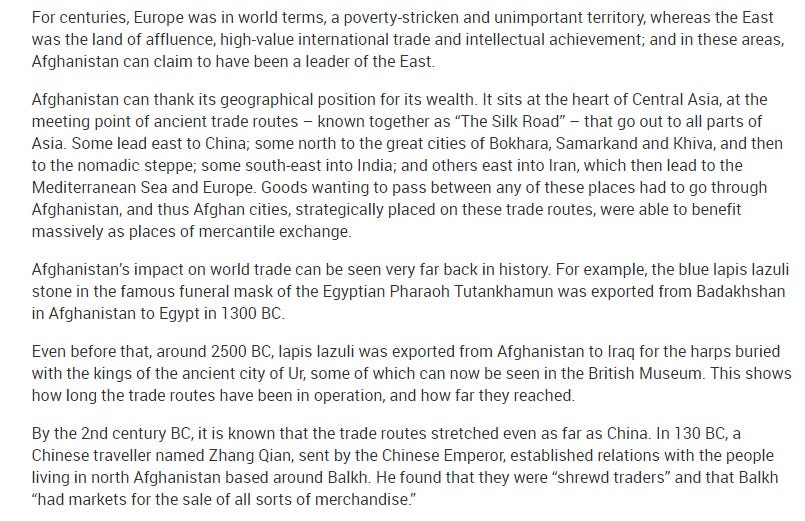
Afghanistan is often called the Graveyard of Empires – the British, the Soviet Union, the US and so many others (Persians, Greeks, the Arabs, the Turks) have tried to conquer Afghanistan – every single one has failed. They all blamed their failure to conquer the land of the Pashtuns on many things – on the country’s mountainous terrain, its harsh winter and – maybe most importantly – its “impregnable clan loyalties”. One thing is clear – Afghanistan has a rich history and despite its almost impenetrable resistance, it’s being wiped away through war. In 2001, the Taliban blew up the Buddhas of Bamiyan, statues that had stood 180 feet high for over 1,400 years.
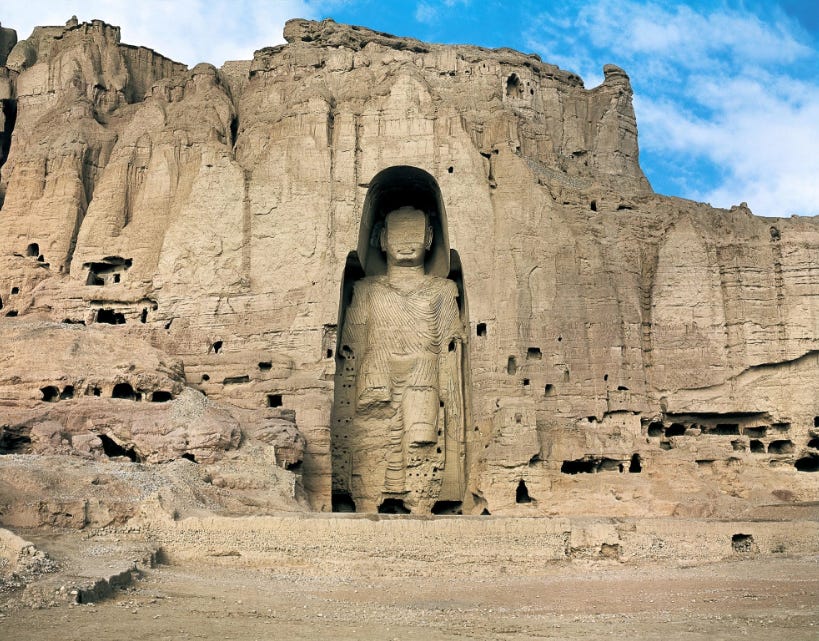
Look, one war giving birth to another
one war crawling out from between the
legs of another, out of the rubble
of one war crawls out another
look, a snake swallowing its own head.
– War Poem
It reminds me of not only the human loss but the cultural losses of places like Palestine, Iran, Iraq and Syria that we have witnessed in our lifetimes. Not only is there no peace in the East but it’s being erased before our eyes, so gradually that one day we’ll wake up and see that nothing is left. The history of Mesopotamia – the location of the beginning of civilization – is being washed away.King Khan 🇵🇸 @MazHalimaFound an article I wrote for the The Muslim Weekly in 2008 (how old am I?) and on the back was an article on tourism in Syria – ‘Damascus: The Eye of the Whole East’. It makes me so sad to think that in less than a lifetime, it’s all gone. May 23rd 20181 Retweet3 Likes
During the Syrian civil war (2011 – present) the Raqqa museum was looted, and 5,000-year-old figurines of the Goddess Ishtar were stolen. Ishtar, the goddess of sex, love, war, justice and political power. Ishtar, the ‘queen of heaven’, ransacked.
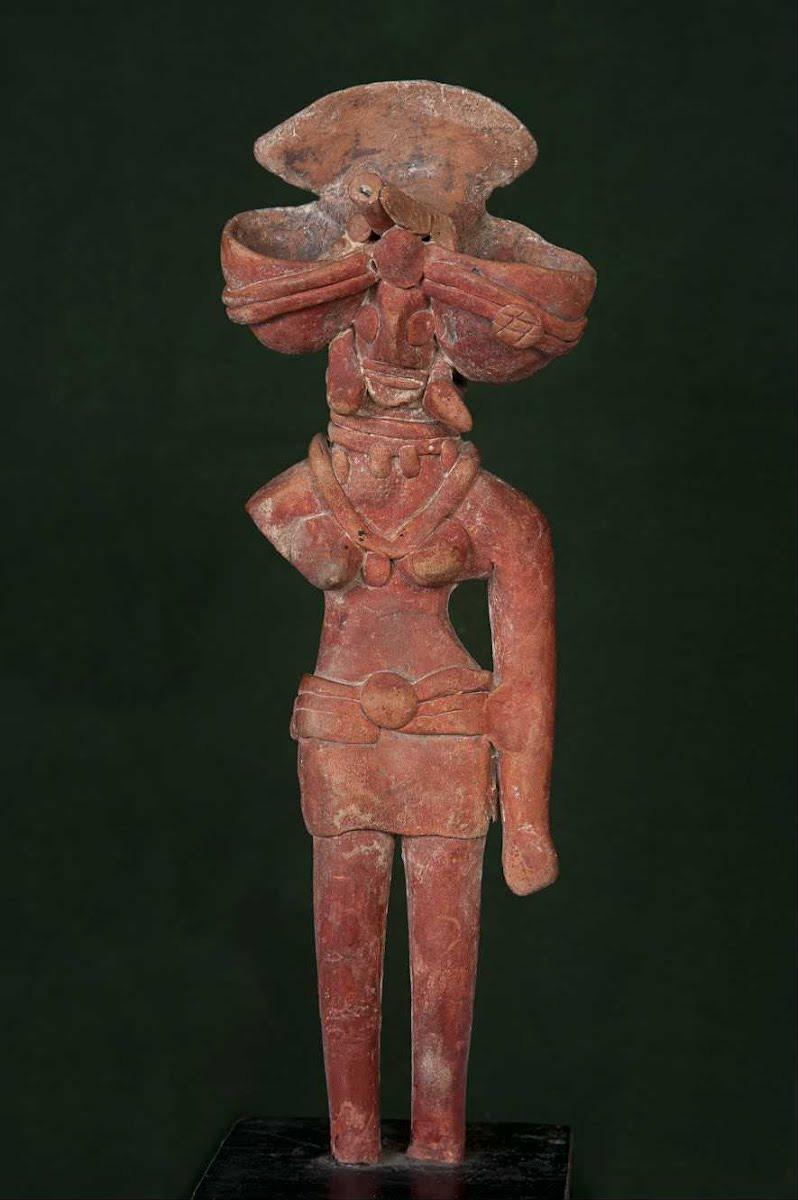
5,000 years ago, the Indus valley (present-day India and Pakistan) worshipped the mother goddess for her fertility – evidence of this can be found in the New Delhi museum today (see photo above). The sun goddess of Japan, Amasterasu was believed to be the supreme ruler of the world. Of course, there is also (the absolute bad-ass) Kali in India – the goddess of time, creation, destruction and power. Women are the be-all and end-all.
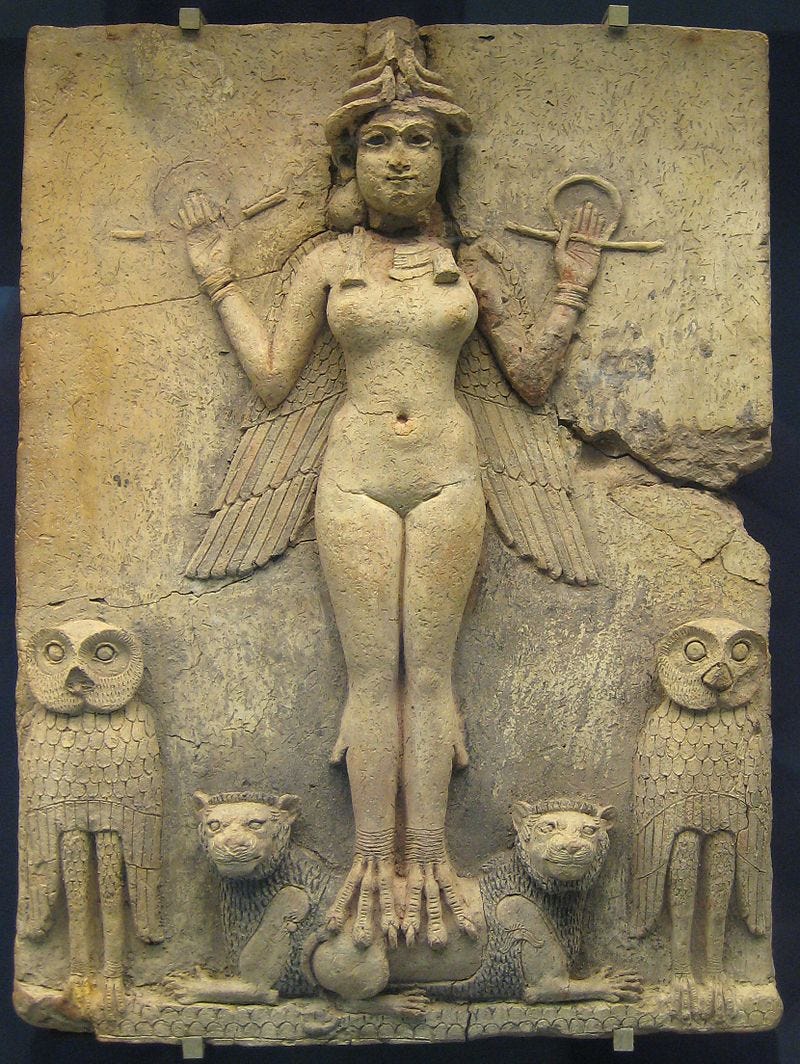
Of course, ancient Egypt also worshipped an impressive number of goddesses – Isis, the goddess of magic and wisdom; Sekhmet, the goddess of war and Nut, the goddess of the cosmos (so many goddesses, so little time). Another fave is Ereshkigal, the Iraqi goddess of the underworld.
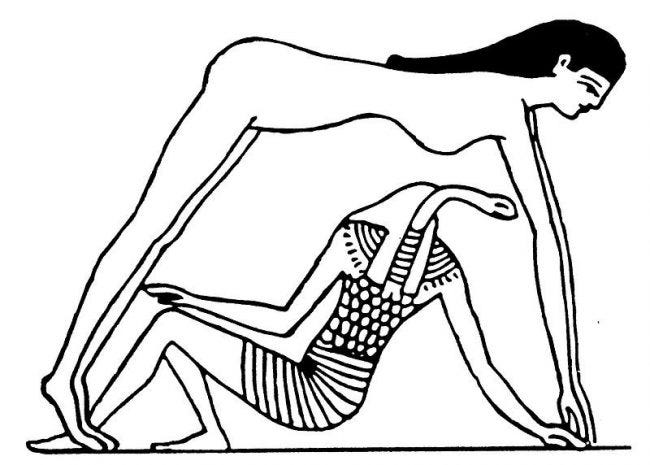
Mesopotamia, the Indus Valleys, ancient Egypt – they all created magic we can’t even understand how to emulate today (example: the pyramids).
Fact: the dawn of civilization bloomed when godliness had a direct connection to femininity – now we’re in a place where civilization will likely go extinct under patriarchal rule.

I think we might have two choices – to set things on fire, or to be set on fire. All I know is we can’t keep living like this:

In ancient Egypt they believed there were thirteen steps on the ladder that leads to eternity – reach the thirteenth step and you have arrived at spiritual completion. Thirteen is a lucky number in China. To the Aztecs in the Americas, 13 was a sacred number. The Thai new year falls on the 13th. In the Hindu calendar the 13th day of the month is a good omen. Italy once associated the number 13 to luck through the ‘great goddess of fertility’, responsible for lunar cycles. You get the drift.
In tarot, 13 is the death card… but not in a gloomy way. It signifies change, transcendence, elevation. As the ancient Egyptians put it, spiritual completion.
Through the rage (which can act as a great driving force for change) we have to find peace in the fact that some things are outside of our control, for the sake of our sanity. I spoke to Fariha Roisin this summer (read that here) and one thing she said about finding peace in a world full of chaos stuck with me.
“I’m deeply invested in facing the apocalypse – and coming to God, through nature, through my love of Mother Earth, has been a remarkably healing way of doing it.”
Recommended reading
Merlin Stone’s ‘When God was a woman’
Mona Eltahawy’s ‘The seven necessary sins for women and girls’
Chimamanda Ngozi Adichie’s ‘We should all be feminists’
Warsan Shire’s ‘Teaching my mother to give birth’
